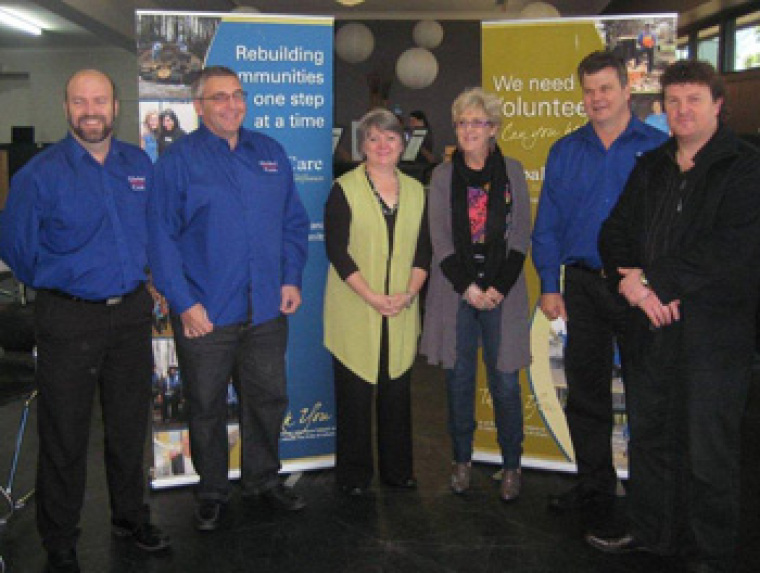
The seminars, organised by Global Care, the social justice and disaster relief arm of Christian Outreach Centre, were addressed by community and disaster relief specialists from the Kinglake Bushfire region in Victoria and both the Lockyer Valley and Ipswich/Goodna flood disaster areas in Queensland.
Brad Quilliam, President of the Kinglake Ranges Business Network, told delegates that the main lesson he had learned in the aftermath of "Black Saturday" in February 2009 was that combating hopelessness and low morale was a key issue in rebuilding community and business confidence in the wake of a major disaster.
Brad, who runs a printing company in Kinglake, and lost his own house to the fires, said communities and businesses had to "reinvent" themselves after a tragedy, and it was important that people recovered in different ways and over different periods.
"There are strained relationships at all levels, as people battle exhaustion and both physical and mental fatigue. Issues include insurance, financial records and facing piles of bills.
"It is important that there is good leadership, and that all groups within the community work closely and cooperatively to rebuild and restore confidence ... there is a need to put wisdom over emotion, with groups such as local councils and service clubs lead by example lift morale and restore hope," he said.
Anne Leadbeater, Manager of Community Engagement with the Office of the Victorian Emergency Services Commissioner, said with 747 homes destroyed and 46 dead, Kinglake Ranges residents felt isolated and confused after the fires, with lack of fuel, water, perishable food and - above all - information.
She said: "There were no phones, internet or TV - the community was traumatised with people displaced and kept away from their homes by roadblocks, and nobody could get any accurate information in the immediate aftermath of the fires.
"The need for accurate and timely information was paramount, and we learned quickly that we had to build constructive partnerships with the media, and devise methods to give people vital information.
"We learned very quickly how important word of mouth and face-to-face communication is, and we set up community briefing sessions several times a day in our 'big white tent' set up in a central location. We had to provide only facts, with no speculation, and keep the information simple - in 'bullet points'.
"We also had to tailor information to the needs of the people, and we did that by listening to the questions - at first they were all about survival issues like food, fuel and water, but within two weeks, people were asking about BAS statements and how to pay their rates.
"The courage and resilience of ordinary people is what amazed me, in the face of too much grief, too many tears and too many funerals. Recovery is a long journey, and we just have to put one foot in front of the other till we get it right."
Global Care's National Coordinator, Pastor Russell Wright, who had himself spent two years in Kinglake, said volunteers and organisers alike had been able to learn from the experience of the bushfire disasters in handling the recovery of the Queensland floods.
He said: "The seminars helped us learn from the experiences in Kinglake, and I think has given people a new empathy for those devastated by a natural disaster, be it flood, fire, tsunami, earthquake or hailstorm.
"For people who have lost so much through a natural disaster, nothing is ever the same again ... they have to come to terms with a 'new normal', and make peace with a whole new reality and life.
"One of the most important things is to encourage people to become self-reliant and confident again, and not to slip into a long-term 'welfare mentality' where they expect everything to be done for them. We try to inculcate self respect, resilience, courage and hope."
Pastor Jonathan Oastler, Director of Global Care's flood recovery work in the Lockyer Valley and Ipswich/Goodna regions, said Global Care played its most important role in the secondary, or long-term secondary recovery phase of a natural disaster.
Pastor Oastler, who is also Senior Pastor of Citilife Christian Outreach Centre Church in Toowoomba, said: "Within two or three weeks, most of the early response providers such as the Army move out, and it is essential that agencies such as Global Care remain in place to help people work through the pain and confusion of rebuilding lives, families and businesses after the emergency winds down.
"Global Care's motto is 'mates helping mates', and we commit ourselves to be there for as long as it takes to help people through the long term recovery period ... we were in Kinglake more than two years, and we will have volunteers in the flood-ravaged areas of Queensland for as long as it takes.
"The emergency ends, but for many people, the disaster almost never ends - we must be there to reach out the hand of compassion and God's love to all who are hurting. We do not preach to people, but Global Care volunteers - the many thousands of them - are there, as Premier Anna Bligh said recently, to be 'Jesus in overalls, Jesus in gumboots and Jesus providing care, comfort and succour to those who suffered so terribly'.
"Governor General Quentin Bryce, in a message to Christian Outreach Centre recently, said: 'As you champion Christian values, your devotion inspires goodwill and provides a source of support for people in times of stress and difficulty. We saw this as your members gave assistance during the Queensland floods as Global Care volunteers - they were there responding to calls for help, rebuilding homes and the lives of those affected, maintaining a reassuring presence of compassion and hope'."
